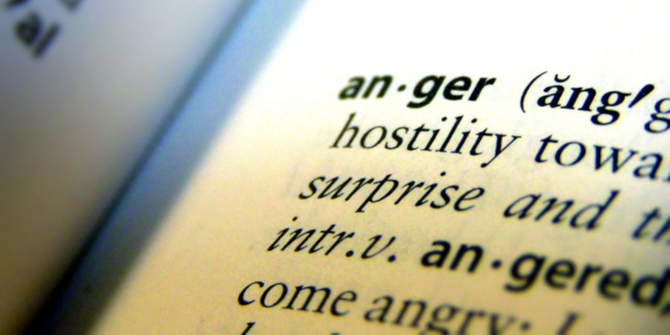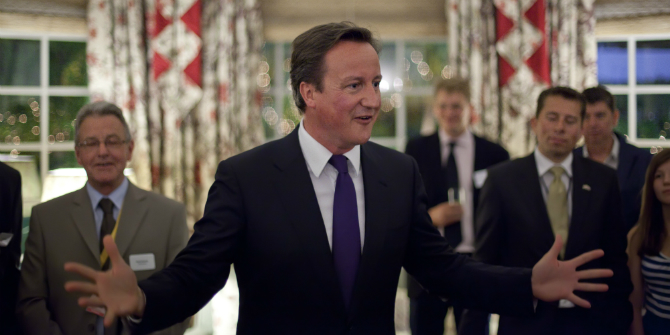 A study of the 2019 European Parliament election campaign indicates that electoral hostility is no longer the reserve of public attitudes towards political elites, but is also manifesting animosity between citizens, writes Sarah Harrison (LSE). She finds that people are now less willing to accept sacrifices to protect others in the community whom they disagree with. This dynamic puts into questions the logic of a democratic society.
A study of the 2019 European Parliament election campaign indicates that electoral hostility is no longer the reserve of public attitudes towards political elites, but is also manifesting animosity between citizens, writes Sarah Harrison (LSE). She finds that people are now less willing to accept sacrifices to protect others in the community whom they disagree with. This dynamic puts into questions the logic of a democratic society.
The Electoral Psychology Observatory (EPO) alongside Insight Agency Opinium has launched a monthly “Hostility Barometer” that will track indicators of electoral hostility over time and assess wider perceptions of electoral atmosphere. The barometer will be conducted in the UK and will also be run in the US later in the year. Interestingly, the findings of the first wave of the barometer conducted during the 2019 European Parliament elections indicate that electoral hostility is no longer the reserve of public attitudes towards political elites, but is also manifesting animosity between citizens. The progressive expression of this electoral hostility may have far-reaching consequences on a systemic, personal and societal level.
First of all, we find evidence that suggests a systemic consequence of a growing hostility between citizens. This is evident in the respect that people are now less willing to pay taxes to protect those who voted differently from them economically or socially. For instance, 47% of British citizens explain that they would resent having to pay more taxes to benefit citizens who suffer economically as a result of having voted for a party that they did not support themselves. 34% of respondents explicitly state that those who voted for a party they disagree with should suffer the economic consequences of that party’s policy, with the same proportion also suggesting that they should be the ones suffering from any deterioration in public services. Critically, the proportion of people who begrudge the idea of paying more taxes to bail out those who fall victim of the electoral outcome that they supported increases to 51% among those who voted to Remain. This is particularly noteworthy since Remainers are significantly more likely to come from younger and wealthier categories of population that are more likely to be net contributors to the fiscal system. This could, in fact, endanger the concept of national solidarity as citizens may question or even resent paying taxes to protect those who vote differently from them. A political system is reliant on the solidarity and goodwill that citizens entrust upon it. If people are not willing to accept sacrifices to protect others in the community, it questions the whole fabric of a democratic society.

Electoral hostility has also had a significant effect on how citizens identify and relate to one another on an inter-personal level. For instance, a sense of growing hostility between individuals or groups can make people feel increasingly alienated from fellow citizens. A considerable proportion of British citizens could imagine insulting others due to electoral differences (16%), and perhaps even more worryingly, 11% can even imagine having a physical fight with those people. This underlines an increasing distance and aggression between citizens based purely on electoral preferences. Unsurprisingly, the question of Brexit succinctly highlights this opposition. 32% of Remainers feel that recent elections have made them feel more alienated from other Brits (and only 20% closer to them). At the same time, 35% say that the same elections have made them feel closer to other Europeans (35%) and only 21% more alienated from them. Interestingly, when it comes to Brexiters, the feeling is almost symmetric when it comes to other Europeans (37% feel more alienated from them and only 10% closer), yet, it has not made them feel any closer to other Brits either (only 21% feel closer to them vs 20% of Remainers).
There is not much cause for optimism in thinking that things might get better. Our findings show that 64% of respondents believe that citizens will continue to grow further apart and that 57% are worried that things will only go from bad to worse. Moreover, only 27% of people believe that the generation of their children and grandchildren will live better than theirs. Overall, these findings suggest a general sense of hopelessness in which citizens recognise that they may endure further deteriorations in these personal, social, and systemic consequences of electoral hostility. Measuring the evolution of electoral hostility, understanding its nature and its causes and assessing its consequences is precisely the aim of our ELHO project funded by the European Research Council, and our Hostility Barometer will also enable us to track its evolution every month in this unprecedented period in the history of British democratic politics.
This post represents the views of the author and not those of the Brexit blog, nor the LSE. A modified version of this article was previously published by the author in the Independent Voices under the title “Hostility between voters over Brexit feels hopeless, but our research may show a way to bridge the divide” on 3 June 2019. Image by Caleb Roenigk, Some rights reserved.
Sarah Harrison is Assistant Professorial Research Fellow in Political Science in the Department of Government at the LSE, and Deputy Director of the Electoral Psychology Observatory.







Indeed. One reads stories in the press of how people are refusing potential partners or breaking up because of disagreements about Brexit, for example this one: https://www.esquire.com/uk/life/sex-relationships/news/a15746/a-staggering-16-million-people-broke-up-over-brexit/ or this one https://www.standard.co.uk/lifestyle/esmagazine/kate-glass-on-why-leaving-the-singles-market-has-never-been-harder-a3782636.html . I mean come off it folks, if you are looking for someone to live with, bring up children with, grow old with, and depend on in good and bad times, is a common understanding on the appropriate jurisdiction the European Court of Justice should have over the United Kingdom really number one on your list of priorities?
Right now the situation is crazy. I live in Germany but whenever I visit the old country and meet someone new, I know the first ritual is going to be establishing where we are on the B-word. I remember the glory days of Thatcherism but they weren’t THAT bad and I think it was possible to be friends with someone with a different opinion of the miners’ strike or the BT privatisation to yours. Someday I hope the current Brexit madness will pass.
The problem with this research, and the article, is that so far it gives us only a snapshot, so doesn’t say anything about trends over time. For example, 16 per cent of British citizens could imagine insulting others due to electoral differences, but who is to say whether that represents a deterioration or an improvement over time?